War is a brutal and destructive event that has plagued humanity throughout history. It leaves physical devastation and significant emotional scars on those who witness it.
It reminds us of the darkest aspects of human nature, from violence and destruction to pain and loss.
While wars may end, their consequences can echo for generations, influencing the trajectory of cultures and countries. Even decades after the Vietnam War ended, the scars of the struggle remain in Vietnam.
See more: Experience the Magic of Vietnam’s Holiday Delights.
Contents
The War Remnants Museum
The War Remnants Museum in Ho Chi Minh City bears witness to the war’s ongoing legacy and impact on the Vietnamese people and society.
The museum was founded in 1975 as the Exhibition House for US and Puppet Crimes to document and memorialize the atrocities during the conflict.
It is now one of Vietnam’s most famous museums, attracting domestic and international visitors. The exhibits present a thorough and often heartbreaking narrative of the war, highlighting the conflict’s destructive impact on people and the environment.
This article will look at the War Remnants Museum in depth, evaluating its history, significance, and influence.
We will explore the museum’s numerous displays and the stories they tell, as well as the ways in which it functions as a place of learning and healing. We will also provide a tourist guide with information about the museum’s opening hours, ticket costs, and how to get there.
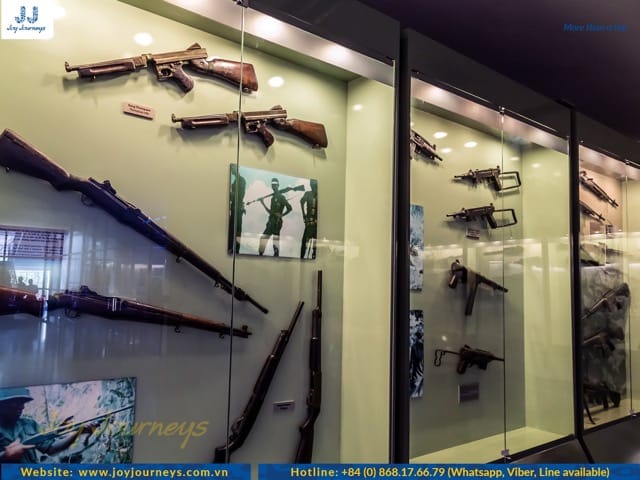
Basic Information and History of the War Remnant Museum of Saigon
The War Remnants Museum in Ho Chi Minh City is a sobering reminder of war’s brutality. Its exhibits provide visitors with an insight into the tragedies of the Vietnam War and its impact on the Vietnamese people.
The museum opened in 1975 as the Exhibition House for American and Puppet Crimes, but its name was changed to the War Remnants Museum in 1995 to reflect the museum’s shift in focus to recording the conflict and its aftermath.
The museum’s displays are organized into sections, each with a different topic.
The first section, “Historical Truths,” presents an outline of the war and its historical backdrop. Photographs of significant events and individuals, including Ho Chi Minh, the founder of modern Vietnam, can be found here.
A collection of war propaganda posters is also included in this section, which provides insight into the strategies utilized to rally support for the war effort.
The following section, titled “Requiem,” is a striking and sad collection of images of those who were killed during wartime captured by photojournalists.
Discover the distinctive cuisine of Saigon as we delve into the local food scene in this article.
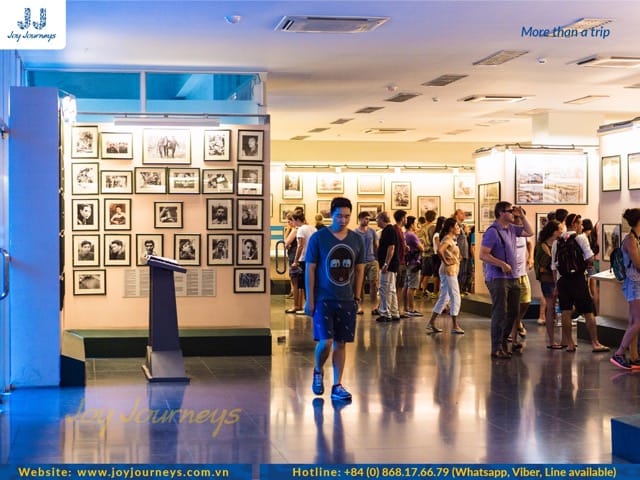
Their photographs depict war’s tragedies, from the devastation caused by bombers to the agony of civilians caught in the crossfire.
The images are disturbing and serve as a reminder of the human cost of war.
Other exhibitions at the museum look into different facets of the war, such as the use of chemical weapons, the media’s role, and the war’s impact on the environment.
The Agent Orange exhibit, which details the chemical’s disastrous impact on the people and environment of Vietnam, is one of the most horrific aspects.

Photographs of children born with serious birth abnormalities due to chemical exposure are included in the display.
Overall, the War Remnants Museum is a sobering reminder of the horrors of war and its toll on individuals and societies.
The displays in the museum are meticulously designed to give visitors a broad overview of the Vietnam War and its impact.
The significance of the museum cannot be emphasized, as it serves as a vital reminder of the horrors of war and the necessity for peace and reconciliation.
Anybody interested in learning more about the Vietnam War and its influence on Vietnamese society should visit the War Remnants Museum.
The exhibitions are thought-provoking and emotional, and they provide a unique viewpoint on one of the twentieth century’s most significant events.
While the museum’s exhibits are not always easy to see, they serve as a compelling reminder of the need to recognize the effects of war and work towards a more peaceful and just world.
Exploring the enduring spirit of Vietnam through the lens of the Independence Palace, highlighting the power of perseverance.
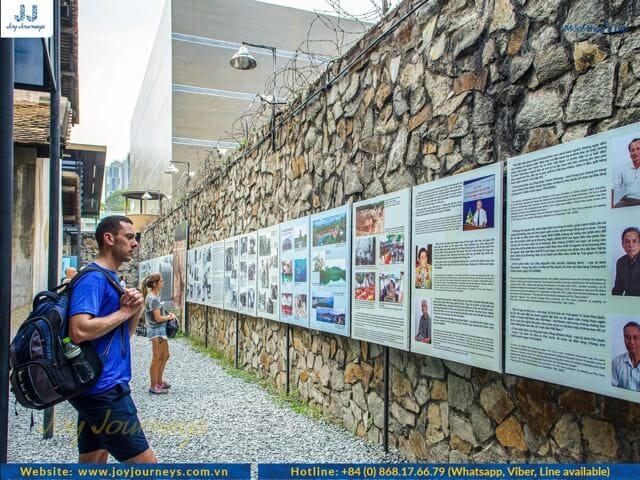
Ticket Price, Opening Hours, and Location
The War Remnants Museum is well-known for its accessibility and affordability, in addition to its impressive exhibitions and collections.
The museum is open to the public every day from 7:30 a.m. to 6:00 p.m. for a VND 40,000 admission fee (approximately USD 1.75). Tickets can be purchased at the museum entrance.
The museum is easily accessible by taxi or public transit and is located in District 3, just a short distance from the city center. Tourists can take a bus or a motorcycle taxi from several spots throughout the city or use a ride-sharing app like Grab. Parking is available near the museum for those who drive.
In addition to its regular exhibits, the War Remnants Museum conducts special events and exhibitions throughout the year. These events provide visitors with the opportunity to learn about many parts of the conflict and its aftermath, and they frequently include guest speakers and participatory activities.
Visitors can find out about forthcoming events and exhibitions by visiting the museum’s website or social media channels.
Additional information: This is the website of the War Remnants Museum.
The War Remnants Museum, as a strong and emotional venue, might be a difficult experience for some visitors.
Here are a few pointers to help you get the most out of your visit:
Visit the exhibitions with an open mind and heart: The museum’s displays are powerful and emotional, and they may generate intense feelings from visitors. Approach the exhibits with an open mind and heart, and be prepared to encounter challenging emotions.
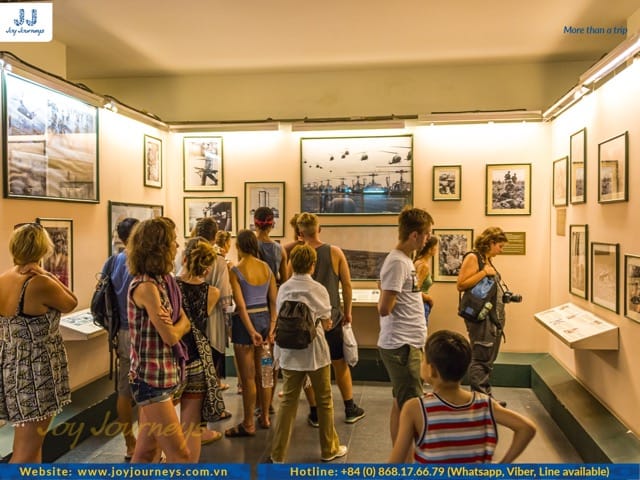
Take your time: The museum’s displays are large and span a wide range of topics. Take your time exploring each part, and don’t rush through the displays.
Be respectful: The displays in the War Remnants Museum are delicate and emotive, and it is crucial to be respectful when visiting. Resist taking selfies or other indecent images, and avoid making loud noises or disrupting other visitors.
Appropriate dress code: The museum, as a place of study and reflection, needs suitable attire. Dress modestly to respect the museum’s displays and avoid wearing exposing or unpleasant clothes.
Pursue additional study and education: Vietnam’s rich history and culture are reflected at the War Remnants Museum. Consider exploring additional learning and information about the country and its people through books, videos, or other resources.
Visiting the War Remnants Museum can be an emotional and stressful experience, but it is also a strong reminder of the consequences of war and the importance of peace and healing.
You may make the most of your visit and commemorate the memories of those who suffered during the Vietnam War by approaching the displays with an open mind and heart, taking your time, and being polite.
Prepare for an exciting adventure as we embark on a journey along the majestic Saigon River.
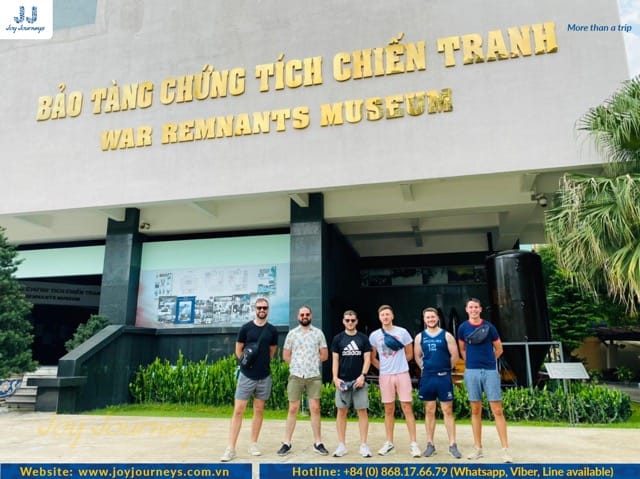
Conclusion
Finally, the War Remnants Museum in Ho Chi Minh City is a powerful and dynamic location that reminds us of the consequences of war and the importance of peace and healing. The museum provides a complete overview of the Vietnam War and its impact on the Vietnamese people through its exhibits and materials.
Visitors to the museum should approach the exhibits with an open mind and heart, taking their time to investigate each part properly and being respectful of the museum’s delicate and emotive exhibits.
We also encourage more learning and enlightenment on the museum’s topics and recommend suitable dress.
Overall, the War Remnants Museum is a must-see in Ho Chi Minh City for anybody curious about the Vietnam War and its aftermath. Its accessibility, affordability, and emotional impact make it a desirable destination for all types of visitors.
We welcome you to experience the museum’s compelling stories and emotions for yourself and to utilize the experience as a means of reflection and understanding.


Related Posts
Food Market Ho Chi Minh: Where To Eat Like A Local
Explore the flavors of Vietnam at every food market Ho Chi Minh has to offer! From the iconic Ben Thanh Market to lesser-known local spots, these bustling hubs are where street food, culture, and community come together. Start your culinary journey in the heart of the city today. Contents1 Why Explore Food Market Ho Chi […]
Night Market Ho Chi Minh City: A Shopper’s & Foodie’s Guide
Discover the best night markets in Ho Chi Minh City! From Ben Thanh’s buzz to Ho Thi Ky’s flowers & food, find top spots for shopping, street food, and local culture. Experience the vibrant energy of night market Ho Chi Minh scenes, where the city truly comes alive after dark. From the iconic Ben Thanh […]
Ho Thi Ky Flower Market: A Blooming Paradise in Saigon
Ho Thi Ky Flower Market is one of the most colorful and enchanting Saigon attractions you won’t want to miss. Whether you’re a photographer, culture lover, or simply seeking a refreshing escape from the city buzz, this market offers a truly immersive local experience. Open 24/7 and busiest in the early morning hours, it’s not […]